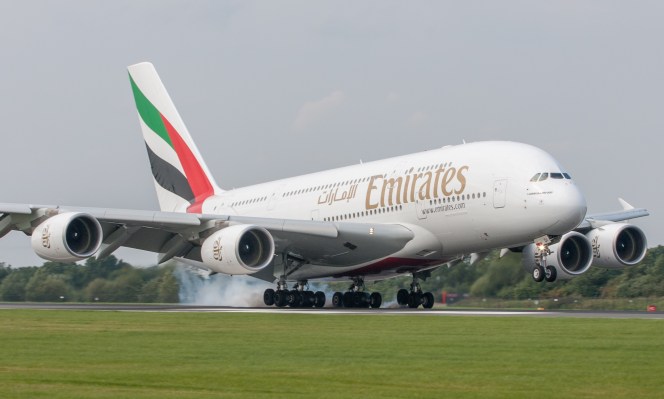After a lot of confusion yesterday, we have now learned from senior administration officials that the U.S. is indeed banning U.S.-bound passengers from carrying any personal electronic devices larger than a smartphone in the passenger cabin. Instead, they will have to put their laptops, tablets, game consoles, cameras and portable DVD players into their checked baggage. This new order does not have a stated end date
Called the TSA “emergency amendment,” the order affects nine airlines that fly out of 10 airports in the Middle East and Northern Africa:
- Jordan’s Queen Alia International
- Egypt’s Cairo International
- Turkey’s Istanbul Ataturk
- Saudi Arabia’s King Abdulaziz International
- Saudi Arabia’s King Khalid International
- Kuwait International
- Qatar’s Doha International
- Morocco’s Mohammed V Airport
- Dubai International
- Abu Dabi International
The nine impacted airlines are Royal Jordanian, EgyptAir, Turkish Airlines, Saudia, Kuwait Airways, Royal Air Maroc, Qatar Airways, Emirates and Ethiad Airways. In total, these airlines operate about 50 direct flights to the U.S. every day.
The affected airlines have up to 96 hours to implement these changes. If they don’t, the FAA can revoke their certificate and ban them from flying into the Unites States. In the wake of the 2016 attack on Istanbul Ataturk, the FAA temporarily banned all flights from that airport to the U.S., for example, so it’s not unprecedented for the U.S. government to take this kind of action.
The officials stressed that this electronics ban is about the airports these flights leave from for their direct flights to the U.S., not about the affected airlines or the countries they fly from. You’ll notice, though, that no U.S. airline is affected by this ban because no U.S. airline currently operates direct flights to and from these destinations.
Why is the U.S. implementing this ban now? While the administration officials wouldn’t comment on any new and specific threats, the government made the decision based on evaluated intelligence that seems to indicate that some terrorist organizations are indeed looking at using consumer electronics to hide explosives and smuggle them onto passenger planes. According to these senior government officials, the February 2016 downing of Daallo flight 159 from Mogadishu to Djibouti was brought down by this kind of device, though it’s hard to explain today’s ban based on an incident that happened more than a year ago.
In addition to the fact that this ban seems random and rather sudden, there are some obvious issues with it. The FAA, after all, explicitly bans passengers from putting any lithium-ion batteries into their checked baggage because of the risk of those batteries catching fire (remember those batteries in hoverboards catching fire last year?). It’s relatively easy to put out a burning battery in the passenger cabin, but it’s kind of hard to do the same in the cargo hold.
There is, of course, also an increased risk of theft if you put your laptop into your checked luggage. When Britain instituted a similar electronics ban in 2006 in response to the same plot that later saw the U.S. launch its 3-1-1 liquids ban, baggage theft reportedly skyrocketed.
The FAA is working with the airlines to implement its best practices for storing computers in the cargo compartment, but as far as I am aware, the FAA’s best practice here is to simply not store them in the cargo compartment at all. So how exactly the airlines are supposed to implement this ban and still allow passengers to put their laptops in their checked baggage remains unclear (or maybe they will have to be checked in separately?). Crew members, by the way, are exempted from this ban, likely because they now often use tablets for their flight planning and for pulling up airport and navigation charts.
Update: we have received the following statement from Emirates that notes that the directive it received is valid until October 14, 2017, though U.S. officials have noted that the ban is currently indefinite: “Emirates can confirm that as per the new security directive issued by the Transportation Security Administration (TSA), regarding electronic devices larger than a cell phone/smart phone, excluding medical devices, cannot be carried in the cabin of the aircraft. The directive comes into effect on 25 March 2017 and is valid until 14 October 2017. It is applicable to all US-bound passengers from Dubai International Airport, whether originating or transiting through. Emirates requests that all passengers travelling to the US pack all electronic devices larger than a cell phone/smart phone in their checked-in baggage.”
Given that today’s ban only affects flights from majority Muslim countries, it’s hard not to see this new order in light of the administration’s previous travel ban. There is no overlap in the affected countries, however.
It’s also worth remembering that a number of U.S. airlines have for years complained about the subsidies that competitors like Qatar, Ethiad and Emirates have received from their respective home countries. The senior government officials we heard from vehemently denied that those complaints, which a number of airline CEO took directly to President Trump last month, had anything to do with this ban on large electronics.
The U.S. is keeping the doors open for expanding this ban to more countries over time and it’s likely that other countries, including the UK, will institute similar rules for flights into their airports, too.
